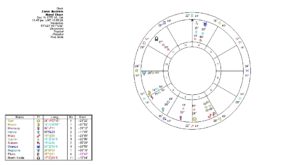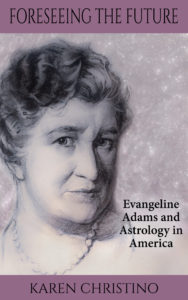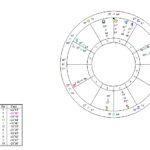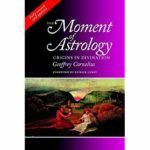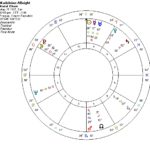Search the web and you’ll find plenty of information on financial astrologer Louise McWhirter, though all of it relates to her 1938 book, McWhirter Theory of Stock Market Forecasting. Her low profile has even led some to speculate she was only a pseudonym for W.D. Gann (a rather sexist theory proposed by a man). But yes, she did exist. 
Wikipedia shares information from a family member’s posts on Ancestry.com. Martha Louise McWhirter was born in 1896 in New York City, and we can find additional family information in Census records. Her younger brother was born two years later. Her father, Robert, was from Texas and her mother was from France. By the time Louise was 14, she was living in Maryland, her father had remarried and he was now a gardener and shareholder in a cooperative farm, which must’ve been an unusual situation at that time.
Louise’s parents had divorced and her mother returned to New York, working as a department store clerk. She died when Louise was only 21 years old.
McWhirter married John Mitchell Henry soon after, and the couple settled in Bayonne, New Jersey. They eventually owned their home and had five children – making it obvious why Louise didn’t publish her book until her early 40s. John worked as an assistant engineer at an oil refinery and Louise was a stay-at-home mom. Apparently she used her middle and maiden names for her work for privacy. She had studied the astrology of financial markets for years and one would guess that she made some modest investments herself. Perhaps she did readings for clients.
Evangeline Adams and her teacher Catherine Thompson had used some financial forecasting techniques beginning in the late 1900s. The stock market crash of 1929 brought more interest in predicting the highs and lows of the market. Sepharial and L. Krohn had written a few books on the subject in the ‘teens, W.D. Gann was also writing by that time, and James Mars Langham and L.J. Jensen had published financial astrology texts in the early ‘30s. McWhirter says she originated the New York Stock Exchange chart, and Graham Bates credits her with rectifying it.
We don’t know exactly who Louise’s astrology teachers were. Her home was within commuting distance from Manhattan, where she might have taken classes with one of Evangeline’s former employees like Iris Vorel, Myra Kingsley, Nella Webb or Lynn Wells. Other New York astrologers at the time included Elizabeth Aldrich and Katherine Taylor Craig. Astrologer Juliet Pontin had a home in New Jersey and an office in the city.
McWhirter used the North Nodal cycle, transits and lunations to the NYSE and incorporation charts for long and shorter-term forecasting. She was a Libra with Jupiter in Virgo and her book is a clear and workable instruction manual on how she used astrology to forecast the ups and downs of the markets. As she said, “It is no longer necessary to be wiped out on the Stock Market. That is a sign of ignorance.”
I’ll share more about her book and forecasting methods in a later post.
McWhirter Theory of Stock Market Forecasting is on Amazon.

